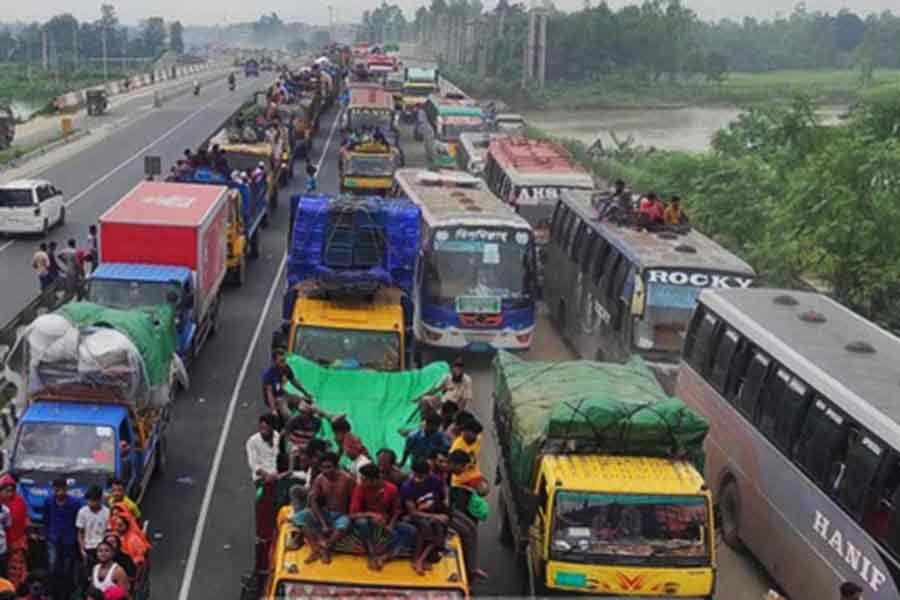Both knowledgeable people and laypersons are apprehensive of a hazardous and highly taxing home-bound mass movement that this Eid is going to witness. Understandably, more people than ever before will undertake journeys to return to their roots---mostly in villages. There are two main reasons for this: for the past two years coronavirus pandemic restrained many from taking the risk of a long and crowded journey and a long holiday of nine days, especially for government employees, will be an additional incentive to travel to ancestral homes for families living in urban centres. Even by a conservative estimate, 10 million people will leave the capital city during the Eid-ul-Fitr holiday. Another 5.0 million will make inter-district journeys for reunion with their near and dear ones all across the country.
During the greatest festival holidays, the rush gets heavier and it is not uncommon for holidaymakers to spend long hours (5-10 hrs) on roads due to tailbacks or at ferry points on account of limited capacities of ferries. Travellers have been warned of the worst possible scenarios on the highways branching out of the capital. Of the four major highways, the Dhaka-Rangpur and Dhaka-Mymensingh highways will reportedly pose particular threat to appreciable movement of traffic. The reason is nothing extraneous but related to their construction work. Although, the authorities time and again instructed for completion of such works well before time, there is hardly any possibility of this happening. Renovation work at the Daudkandi segment of the Dhaka-Chattogram highway may likewise remain incomplete to cause hindrance to movement of traffic. The segment from Tongi to Chandna has turned into a bottleneck on account of the Bus Rapid Transit (BRT) project which has been running behind schedule. Even in normal time, the roads and highways are under pressure to allow smooth flow of vehicles. Constrained by incomplete repair and renovation or interference from delayed projects, they will be in no position to cope with the unusually heavy rush.
Then come the travails at the ferry terminals. Reportedly, only six ferries will operate between Shimulia and Banglabazar and the number of ferries operating on Paturia-Daulatdia has also dropped. Although bus companies have launch service for their passengers, scarcity of ferries means extra load on launches. Overcrowding on a ferry on the Shimulia-Banglabazar channel led to the death of five people during last year's Eid holiday. If fewer ferries are in service at a time of heavier rush this year, the risk of such tragedies will be greater too.
To avoid Eid-time rush, some smart people send their families home weeks before. However much useful and convenient this may be to some, it will not make a great difference to the rush this time. So traffic management has to be as efficient as it is possible. Toll collection by stopping vehicles and parking on roadsides, as is the case in the Sylhet segment of Dhaka-Sylhet highway, has to be done away with. The law enforcement agencies in particular must act rationally and sincerely. If "Eternal vigilance is the price of liberty", constant vigilance during the Eid holiday at least is the price of safe and reasonably less cumbersome journey.


